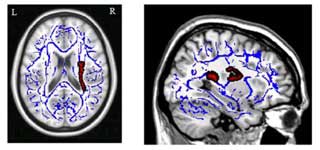By Barry Keate
Barry Keate, has lived with tinnitus over 40 years and has published 150+ research articles on numerous aspects of tinnitus. He is an expert on the condition and a well-known advocate for those with tinnitus.
We’ve all heard stories of people who have lost their sight but then experienced other sensory improvements such as increased hearing levels. This is evidence that our brain is capable of re-wiring itself to compensate for changes in external input. Studies have shown the brains of blind people to be significantly changed neurologically, compared to sighted people, to deal with the situation. (1)
Now there is evidence that hearing loss creates its own neuronal changes in the brain that can be measured. (2) The study, from the University of Illinois, shows that hearing loss causes long-term changes in the brain structure of the estimated 50 million people in the US who suffer from it. Interestingly, those who have hearing loss and tinnitus do not seem to suffer the same changes as those with hearing loss alone.
Researchers used two different, high resolution MRI techniques to measure both gray and white brain matter changes related to tinnitus and hearing loss and in order to dissociate them from changes due only to hearing loss.
They employed three groups of subjects to test the separation; those with hearing loss but no tinnitus, those with hearing loss and tinnitus, and a control group of those with normal hearing and no tinnitus.
It is worth noting, the researchers state that 90% of those with tinnitus have some degree of hearing loss but only 40% of those with hearing loss suffer from tinnitus. This seems to indicate that there may be 20 million people in the US with tinnitus (40% of 50 million).
Analysis revealed that individuals with hearing loss but no tinnitus had gray matter decreases in the frontal cortex that individuals with hearing loss and tinnitus did not have.
The researchers concluded, “However, in the case of tinnitus, surprisingly, there were few changes to brain structure despite changes to function, suggesting that when sensory deprivation is accompanied by self-generated noise, it may be better at preserving neural tissue.”
I’m certain there will be further studies in the future to determine exactly what neuronal changes are involved and how the changes affect brain function.
References
1 – University of California – Los Angeles (2009, Nov. 18). Blindness causes structural brain changes, implying brain can re-organize itself to adapt. Science Daily. http://www.sciencedaily.com/releases/2009/11/091118143259.htm
2 – Husain F, Medina R, Davis C, Szymko-Bennett Y, Simonyan K, Pajor N. Neuroanatomical changes due to hearing loss and chronic tinnitus: A combined BVM and DTI study. Brain Research Vol. 1369, 19 January 2011, pp 74-88.
Get Free Shipping!
Order now and get free shipping on either the Tinnitus Starter Kit or Combo Pack. Try the doctor recommended products with clinically proven ingredients for tinnitus. No coupon code required.


